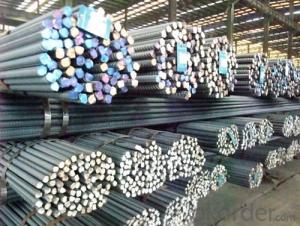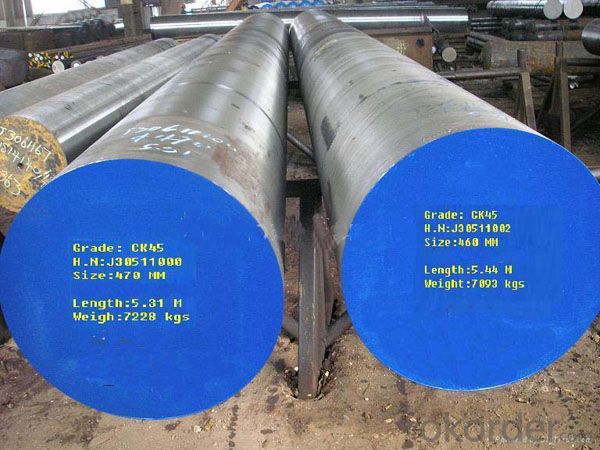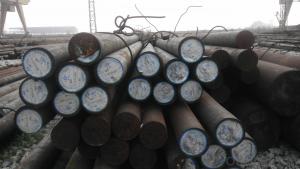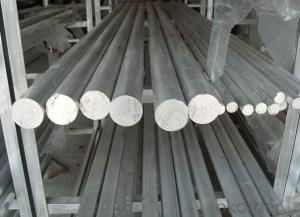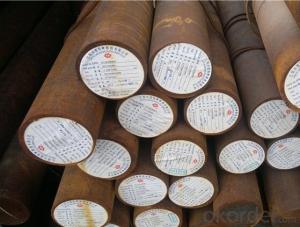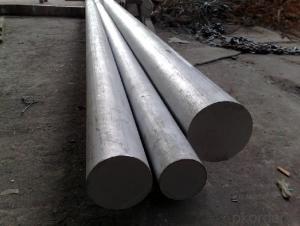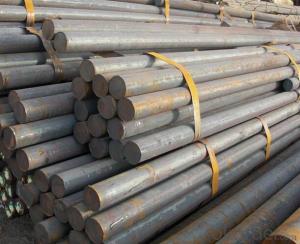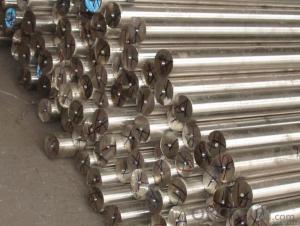Alloy Steel ASTM 6G Special Steel Tool Steel
- Loading Port:
- China main port
- Payment Terms:
- TT OR LC
- Min Order Qty:
- 25 m.t.
- Supply Capability:
- 10000 m.t./month
OKorder Service Pledge
OKorder Financial Service
You Might Also Like
Specification
Chemical Composition(GB)%
| C | Si | Mn | P | S | Cr | Mo |
| 0.50-0.60 | 0.25-0.60 | 1.20-1.60 | ≤0.030 | ≤0.030 | 0.6-0.9 | 0.15-0.30 |
Standard
| GB | JIS | AISI | DIN |
| 5CrMnMo | SKT3 | 6G | 1.2311 |
Heat Treatment
| Item | Temperature ℃ | Hardness |
| Anneal | 760-780 | 197-241HB |
| Quenching | 820-850 | 52-58HRC |
| Tempering | 490-510 | 41-47HRC |
| 520-540 | 38-41HRC |
Characterstics:common hammering forging die steel
Applications:Suitable for various forging dies with higher strength and abrasion resistance
2 steel


1, Your advantages?
professional products inquiry, products knowledge train (for agents), smooth goods delivery, excellent customer solution proposale
2, Test & Certificate?
SGS test is available, customer inspection before shipping is welcome, third party inspection is no problem
3, Payment Terms?
30% TT as deposit and 70% before delivery.
Irrevocable L/C at sight.
4, Trading Terms?
EXW, FOB, CIF, FFR, CNF
6, After-sale Service?
We provides the services and support you need for every step of our cooperation. We're the business partner you can trust.
For any problem, please kindly contact us at any your convenient time.
We'll reply you in our first priority within 24 hours.
- Q: How does special steel contribute to the automotive emission reduction?
- Special steel contributes to automotive emission reduction in several ways. Firstly, it is used in the production of lightweight components, such as body panels and chassis parts. By replacing heavier materials with special steel, vehicles become lighter, resulting in improved fuel efficiency and reduced emissions. Additionally, special steel offers superior strength and durability, allowing for the design of more efficient and compact engines. This enables automakers to reduce engine size while maintaining performance, leading to reduced fuel consumption and lower emissions. Furthermore, special steel is used in the manufacturing of exhaust systems, catalytic converters, and other emission control devices. Its high heat resistance and corrosion resistance properties ensure the effective functioning of these components, thereby minimizing harmful pollutants released into the atmosphere. Overall, special steel plays a crucial role in automotive emission reduction by enabling lighter and more efficient vehicles, enhancing engine performance, and ensuring the effectiveness of emission control systems.
- Q: How is special steel used in the mining industry?
- Special steel is used in the mining industry for various applications such as drilling tools, conveyor systems, crushing equipment, and structural components. Its high strength, toughness, and resistance to wear and corrosion make it ideal for withstanding the harsh conditions and heavy loads commonly encountered in mining operations. Additionally, special steel is used for creating cutting edges and teeth on mining machinery, enhancing their efficiency and durability.
- Q: How are nickel-based alloys used in the aerospace industry?
- Nickel-based alloys are extensively used in the aerospace industry due to their exceptional strength, heat resistance, and corrosion resistance properties. These alloys are commonly used in the manufacturing of various aerospace components such as turbine blades, combustion chambers, and exhaust systems. Their high temperature stability allows them to withstand extreme conditions in jet engines, while their corrosion resistance ensures longevity and reliability. Additionally, nickel-based alloys also contribute to weight reduction in aircraft, as they possess a high strength-to-weight ratio, making them an ideal choice for enhancing fuel efficiency and overall performance in the aerospace industry.
- Q: How does special steel perform in cryogenic wear resistance?
- Special steel typically performs well in cryogenic wear resistance. This is because special steel alloys are specifically designed to withstand extreme temperatures, including cryogenic conditions. These alloys often possess excellent hardness, toughness, and resistance to deformation at low temperatures, making them highly resistant to wear and damage in cryogenic environments.
- Q: What are the environmental considerations of using special steel?
- There are several environmental considerations associated with the use of special steel. Firstly, the production of special steel involves the extraction and processing of raw materials, which can have significant environmental impacts. The mining of iron ore and other minerals required for steel production often results in habitat destruction, soil erosion, and water pollution. Additionally, the energy-intensive processes used to convert raw materials into steel emit large amounts of greenhouse gases, contributing to climate change. Furthermore, the disposal of special steel products at the end of their life cycle can also pose environmental challenges. Steel is a non-renewable resource, and its disposal in landfills can contribute to waste accumulation and resource depletion. However, steel is highly recyclable, and recycling steel products can significantly reduce the environmental impact associated with their disposal. In terms of transportation, special steel is often heavy and bulky, which leads to higher fuel consumption during transportation. This can contribute to air pollution and carbon emissions, particularly if long-distance shipping is involved. Moreover, the manufacturing processes used to produce special steel can generate various types of waste, such as slag and dust, which need to be properly managed to prevent negative environmental impacts. The treatment and disposal of these waste materials require careful consideration to ensure they do not contaminate soil, water, or air. To mitigate these environmental considerations, companies in the steel industry have been adopting more sustainable practices. This includes investing in cleaner technologies, such as electric arc furnaces that use recycled steel as feedstock, to reduce energy consumption and emissions. Additionally, implementing efficient waste management systems and promoting steel recycling can help minimize waste generation and resource depletion. Overall, while the use of special steel has undeniable benefits in various industries, it is crucial to consider and address the associated environmental impacts. Adopting sustainable practices throughout the entire lifecycle of special steel, from raw material extraction to end-of-life disposal, is vital in minimizing its environmental footprint and promoting a more sustainable future.
- Q: What are the main advantages of using special steel in the oil and gas industry?
- The main advantages of using special steel in the oil and gas industry are its high strength and resistance to corrosion, which enhances the durability and longevity of equipment and pipelines. Special steel also has excellent heat resistance, allowing it to withstand high temperatures and pressures commonly found in oil and gas operations. Additionally, special steel offers superior weldability and machinability, making it easier to fabricate and install in complex infrastructure.
- Q: What are the advantages of using special steel in industrial applications?
- There are several advantages of using special steel in industrial applications. Firstly, special steel offers exceptional strength and durability, making it suitable for heavy-duty tasks. The unique composition and manufacturing process of special steel result in a material that can withstand high levels of stress, extreme temperatures, and harsh environmental conditions. This makes it ideal for industries such as construction, automotive, and manufacturing, where reliable and long-lasting materials are required. Secondly, special steel exhibits excellent corrosion resistance. It can resist the damaging effects of moisture, chemicals, and other corrosive agents, which is crucial in industries like marine, oil and gas, and chemical processing. The corrosion resistance of special steel reduces the need for frequent maintenance and replacement, saving both time and costs for industrial applications. Furthermore, special steel offers superior machinability and formability. It can be easily shaped, cut, and welded to meet specific design requirements. This versatility allows for complex and intricate designs in various industrial applications, including machinery, tools, and equipment. Another advantage of special steel is its ability to maintain its properties at high temperatures. It has excellent heat resistance, ensuring that it remains strong and stable even under extreme heat conditions. This makes special steel suitable for applications involving high-temperature environments, such as aerospace, power generation, and furnace components. Additionally, special steel can exhibit excellent wear resistance and hardness. It can withstand abrasion, friction, and impact, making it ideal for applications where materials are subjected to heavy wear and tear, such as mining, construction equipment, and cutting tools. The wear resistance of special steel ensures that components have a longer lifespan and require less frequent replacement. In conclusion, the advantages of using special steel in industrial applications include exceptional strength and durability, corrosion resistance, machinability and formability, heat resistance, and wear resistance. These properties make special steel a preferred choice for a wide range of industries, contributing to improved performance, longevity, and cost-effectiveness.
- Q: How does special steel perform in defense applications?
- Special steel is highly valued in defense applications due to its exceptional properties and performance. Firstly, special steel offers superior strength and toughness, making it highly resistant to impact and penetration. This strength is crucial in defense applications, as it provides protection against projectiles, explosives, and other threats. Additionally, special steel exhibits excellent hardness and wear resistance, making it ideal for applications such as armor plates, vehicle components, and protective gear. Its hardness enables it to withstand high-velocity impacts, while its wear resistance ensures durability and longevity even in extreme conditions. Moreover, special steel possesses excellent corrosion resistance, which is crucial in defense applications where exposure to harsh environments, saltwater, and chemicals is common. This corrosion resistance helps to maintain the structural integrity and performance of defense equipment, even in challenging conditions. Furthermore, special steel can be tailored to meet specific requirements, allowing for the customization of defense applications. By adjusting the alloy composition and heat treatment processes, special steel can be optimized for different purposes, such as ballistic armor, submarine hulls, or aircraft components. Overall, special steel's exceptional strength, toughness, hardness, wear resistance, corrosion resistance, and customizability make it an invaluable material in defense applications. It provides the necessary protection, durability, and reliability required to safeguard military personnel, vehicles, and equipment in various challenging scenarios.
- Q: What are the challenges in recycling special steel?
- Special steel recycling presents several obstacles due to its unique composition and properties. To begin with, special steel often contains various alloying elements, which enhance its strength, durability, and resistance to corrosion. These alloys can complicate and add complexity to the recycling process when compared to recycling ordinary steel. A key challenge is the separation of special steel from other metals during recycling. Special steel may contain valuable and rare elements like nickel, chromium, and molybdenum, which are crucial for its distinct properties. Extracting these elements from other metals demands advanced techniques and specialized equipment, thereby increasing the intricacy and cost of recycling. Another hurdle arises from the presence of impurities in special steel. These impurities can enter during manufacturing or through contamination during use. Eliminating these impurities is essential to ensure that the recycled steel meets the required specifications for its intended applications. However, the high melting point and purification resistance of some impurities can complicate the recycling process. Moreover, the physical characteristics of special steel, such as its high hardness and toughness, make it challenging to handle and process during recycling. Special steel often necessitates energy-intensive methods like shredding or higher temperature melting, which in turn increases the overall cost and environmental impact of recycling. Furthermore, the economic feasibility of recycling special steel can be a challenge. Market demand for special steel can fluctuate, making it difficult for recyclers to maintain a consistent and profitable supply. Additionally, the costs associated with collecting, transporting, sorting, and processing special steel can be higher compared to ordinary steel, further impacting the economic viability of recycling. In conclusion, the difficulties in recycling special steel primarily arise from its intricate composition, the need for separation from other metals, the presence of impurities, the physical characteristics of the material, and the economic feasibility of the recycling process. To address these challenges, innovative technologies, efficient separation methods, and a sustainable market demand for recycled special steel are necessary.
- Q: What are the characteristics of tool steel?
- Tool steel is a type of steel that possesses exceptional hardness, strength, and wear resistance, making it ideal for manufacturing various tools. It typically contains high levels of carbon, along with other alloying elements like chromium, vanadium, and tungsten. Tool steel also exhibits good toughness, heat resistance, and ability to retain sharpness. Additionally, it can be hardened and tempered to achieve desired properties for specific applications.
Send your message to us
Alloy Steel ASTM 6G Special Steel Tool Steel
- Loading Port:
- China main port
- Payment Terms:
- TT OR LC
- Min Order Qty:
- 25 m.t.
- Supply Capability:
- 10000 m.t./month
OKorder Service Pledge
OKorder Financial Service
Similar products
Hot products
Hot Searches
Related keywords
